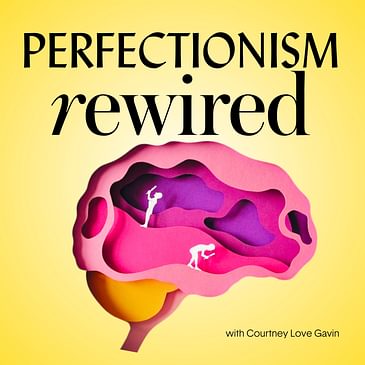Is your Self-Criticism only getting worse? Overthinking a million ways you suck your mind's go-to? If your self-criticism cycles JUST won't quit, it's not bc you need more self-compassion, self-love or a less tragic childhood. It's simply bc you're focusing on the wrong problem and by misidentifying your problem, you're missing out on all the super simple solutions. That silliness ends NOW. Discover the 8 undercover forces driving your self-criticism cycles AND exactly how to solve each one.
If you're DONE with self-criticism holding you back + want to remember what playfully proud of yourself feels like and gain lifetime skills that make you stronger, happier, braver, calmer + more resilient Perfectionism Optimized 1-1 coaching is for you! Sumptuous, science-backed solutions designed specifically for YOUR perfectionistic tendencies. Get your stress-free start today at https://courtneylovegavin.com/optimized
Ep. 212 Timestamps
00:00-Identifying WHY You Self-Criticize
02:46-The ROOT of Self-Critical Pattern No. 1
05:10-How ADHD Feeds Off Self-Criticism
07:20-Why Am I So Hard On Myself? SOLVED
09:55-When Your Career Demands Your Self Critic
11:45-Solutions That Actually Work for Overly Critical Achievers
13:25-Criticizing Yourself to Create Change
16:45-Hyper Critical Power Dynamics
18:33-How To Stop Beating Yourself Up
Truth + Accuracy In This Episode Is Brought To You By:
- Campos, R. C., Holden, R. R., Caçador, B., Ana Sofia Fragata, & Baleizão, C. (2018). Self-criticism, intensity of perceived negative life events, and distress: Results from a two-wave study. Personality and Individual Differences, 124, 145–149. https://doi.org/10.1016/j.paid.2017.12.004
- Ferrari, M., Ciarrochi, J., Yap, K., Baljinder Sahdra, & Hayes, S. C. (2022). Embracing the Complexity of our Inner Worlds: Understanding the Dynamics of Self-Compassion and Self-Criticism. Mindfulness, 13(7), 1652–1661. https://doi.org/10.1007/s12671-022-01897-5
- Thakur, N., & Baumann, N. (2022). Breaking the anxious cycle of self-criticism: Action orientation buffers the detrimental effects of a self-critical personality style. Journal of Affective Disorders, 301, 30–35. https://doi.org/10.1016/j.jad.2022.01.014
Perfectionism is very powerful. But only if you know how to leverage it. For more on optimizing your perfectionism go to courtneylovegavin.com
Get the BEST insights from today's episode + time-stamped show notes by subscribing to The Perfectionist Guide newsletter. To access + subscribe go to: https://courtneylovegavin.com/newsletter




